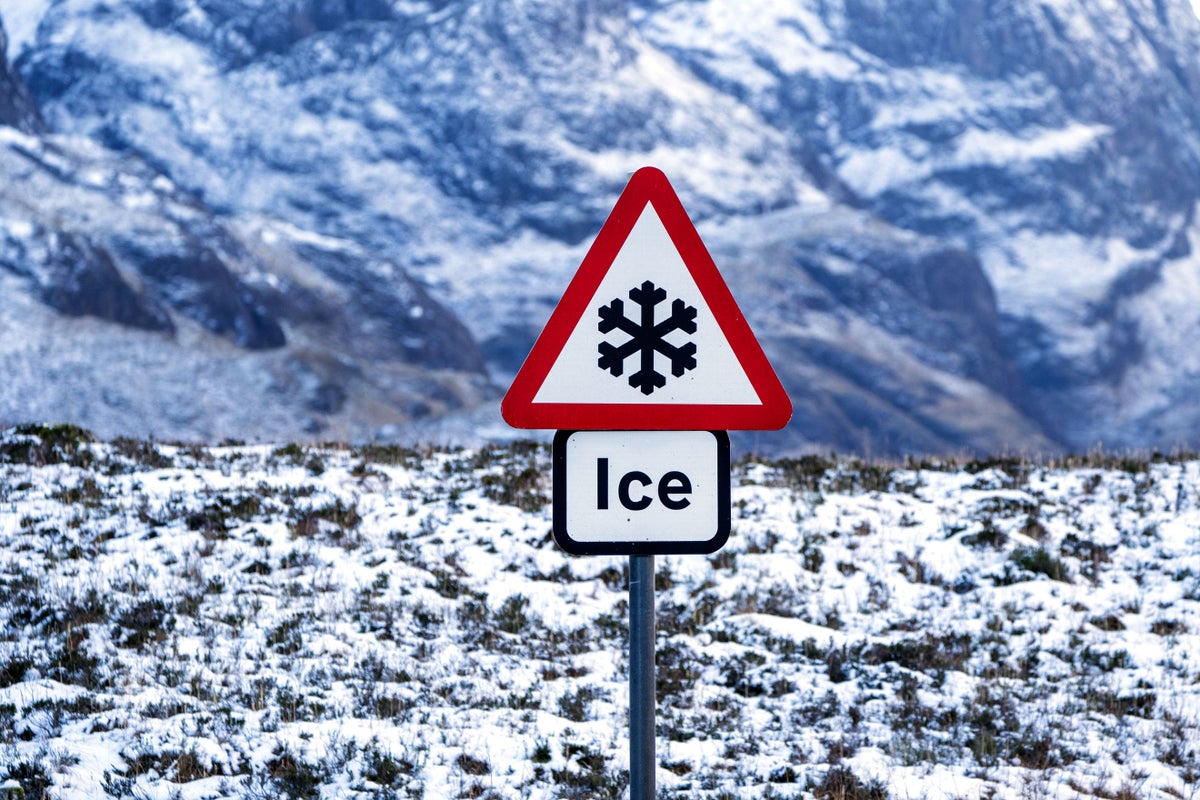
Tuesday night could be the coldest of the year so far, the Met Office has announced, as it issued weather warnings for snow and ice across the UK.
The forecasting body said the mercury could drop to minus 15C in some sheltered Scottish glens, especially where there is fresh snow cover.
The lowest temperature recorded in the UK so far this year is minus 10.4C, which was recorded at Drumnadrochit near Inverness in the Highlands in the early hours of January 19.
Temperatures are set to drop almost six degrees below their coldest last March, when they reached minus 9.1C in Aboyne, Aberdeenshire.
Weather warnings for snow and ice are in place across all four nations of the UK and more are expected to be issued as Arctic air sweeps across the country.
A yellow weather warning for snow and ice will be in place for London, the Thames Valley, East Anglia, parts of the Midlands and South Wales from 9pm on Monday night until 10am on Tuesday.
An identical one will be in place in Northern Ireland at the same time.
A yellow weather warning for snow and ice is already in place in much of Northern and Eastern Scotland and North East England.
We expect these conditions to remain in place until at least next weekend and possibly longer— Grahame Madge, Met Office
The area covered by it is set to extend as far south as Hull from Tuesday before it lifts at 10am on Wednesday.
South West England and South Wales will be covered by a yellow warning for snow all day on Wednesday and a few centimetres of snow could fall in those areas.
North England, North Wales, most of Scotland and Northern Ireland will be covered by a yellow warning for snow between 3am on Thursday and 6pm on Friday.
Snow drifts could occur on Friday, the Met Office said.
Snow began falling in Northern Scotland on Monday afternoon. More than 20cm of it could accumulate over high ground in Scotland and more than 5cm is likely to accumulate at lower levels in the north-east of the UK.
Take every possible step to understand your journey in advance and allow lots of extra time when travelling to prepare for the unexpected— Dale Hipkiss, National Highways
Northern Ireland will initially escape large accumulations of snow but 2cm could settle in some spots on Monday night, most likely over higher ground and northern parts of the six counties.
The Met Office said snow will move from the south to the north of the UK as mild air from the south-west meets cold air.
Met Office spokesman Grahame Madge said temperatures could drop to minus 1C in Manchester and 2C in London on Monday night.
Even colder overnight conditions are set to hit cities later in the week – with the mercury plunging to minus 4C in London and minus 6C in Birmingham and Belfast.
“Temperatures will be much, much colder than we would expect at this time of year.
“The pattern will set in for some time. We have got this feed of cold air coming in from a much higher latitude.
“We expect these conditions to remain in place until at least next weekend and possibly longer because sometimes these conditions can be quite stubborn and not easily subject to change.”
The Met Office warned travel disruption is likely and journey times by car, train and bus may take longer than usual.
People are at risk of slipping and falling on icy patches of untreated roads, pavements and paths while some rural communities could become cut off from the power grid.
Dale Hipkiss, National Network Manager at National Highways, said people should keep warm clothes and a torch in their car in case they get stuck in icy conditions.
He said: “Freezing conditions bring so many hazards such as snow and ice. Take every possible step to understand your journey in advance and allow lots of extra time when travelling to prepare for the unexpected.
The UK Health Security Agency has issued a level-three cold weather alert for the whole of England which is likely to be reviewed in the coming days.
The agency’s Head of Extreme Events and Health Protection Dr Agostinho Sousa said people should check on vulnerable relatives and told pensioners and anyone with an underlying health condition to heat their home to at least 18C.
On March 14 1958 the mercury dropped to a record low for the month of minus 22.8C at Logie Coldstone, Aberdeenshire.







